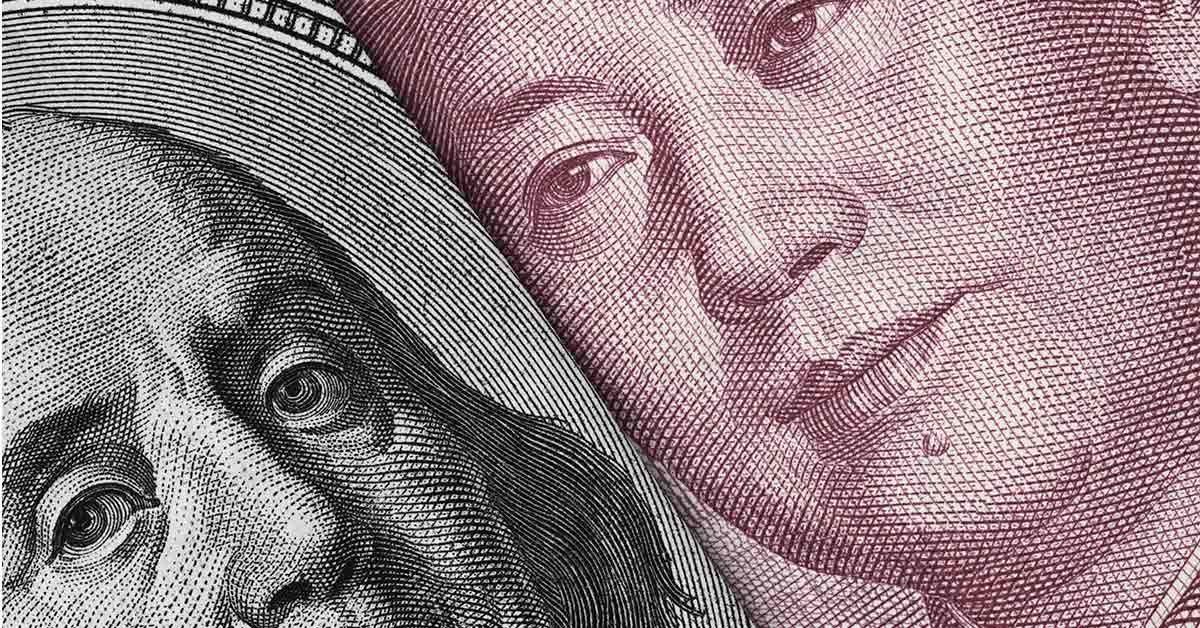A tale of two wars
Decades of trade between the US and China boosted living standards considerably in both nations, but their relationship has been fraying for some time. Rathbones head of multi-asset investments David Coombs believes this unravelling is keeping inflation elevated.

The Ukraine war has been fought for more than a year now, heaping misery on millions and upending a raft of important markets from food to energy.
The effects of the war, both on geopolitics and markets, have dovetailed with an economic war fought between the US and China. This trade war, sometimes loud, sometimes quiet, but ever present, is having real effects on businesses, investments and national strategies from development to energy and import security.
Over the decades, China and the US have often got into disputes about trade, but it really hardened into a sort of cold war in the 2010s. They have traded numerous sanctions and embargoes on all sorts of products, services and investments. Digital technology and important resources have been particularly fierce Sino-American battlegrounds because of concerns about national security and the inherent risks of such technology to customers’ privacy. It just so happens that these sectors – digital technology and the minerals needed to manufacture the hardware to power them – have been some of the most valuable and successful investments of the last decade, which has roiled markets.
Trade is such a powerful force. But the core of its effectiveness is in its freedom – in allowing people to meet and swap what is abundant in their land for something that’s abundant somewhere else. Both sides win when this happens. It also encourages the sharing of methods and technology – bringing new ideas to what would otherwise be insular societies.
Of course, while both countries win from trade, that doesn’t necessarily mean everybody wins. Cheaper, better-quality goods from abroad will destroy the local producer’s business, new ideas will dispense with the need for certain jobs. It’s for governments to set rules for trade: to ensure a fair market that protects labour and product safety standards. It’s also important that governments acknowledge the ‘creative destruction’ of trade and support those who are hurt by it so that they can put their skills and resources to better use elsewhere. When they don’t do this, people start to forget the benefits of trade, focusing instead on the people who are hurt by it. Then calls for ‘protectionism’ – for building barriers to trade – grow louder.
A new world
Trust between trading partners is also an absolute necessity. Unfortunately, trust between the world’s largest trading nations – the US and China – has been ebbing away for years. The war in Ukraine doesn’t help tensions between America and China because they have found themselves backing different sides in the conflict.
China has supported Russia by helping it bypass Western sanctions on sales of oil and gas, and by giving access to the renminbi-based financial system as an alternative to the dollar-based regime that has been denied to Russia. This has given China access to heavily discounted energy and greater financial revenues – helpful boons in tough economic times. But it has also antagonised America and its allies, which have given Ukraine substantial and growing support from day one. This just adds to building tensions between the US and China over the fate of Hong Kong, Taiwan and control of the South China Sea.
In February the US briefed journalists that China was planning to lend military support to Russia. If China does weigh into the conflict, the risk of threats and sanctions from both sides will rise, which could affect trade between them. It also makes investing in China riskier than it was, say, five years ago. You want to see a higher return there to compensate you for the risk of getting caught in geopolitical crosswinds or governmental intervention.
Despite this curdling of Sino-American relations, global trade as a percentage of GDP is roughly where it was 15 years ago, as is international investment. Rather than a reduction in globalisation, we’re seeing globalisation reoriented: a shift from more-hostile trading partners to those who are perceived to be more friendly. For the West, this means less China and more Vietnam, Thailand and South Korea. We expect this to continue.
It also means that many companies are having to spend money to rejig their supply chains and pay more to source metals, components and other inputs from suppliers in less-temperamental climes. Countries are investing more on securing food, important resources and energy as well. These changes are yet more forces making everything more expensive than it would otherwise be, reinforcing our belief that inflation will probably stay higher for longer than most people think. And that means higher interest rates for longer than many are hoping, too. The near-zero-percent interest rates of yesteryear seem confined to history.
Tune in to The Sharpe End — a multi-asset investing podcast from Rathbones. You can listen here or wherever you get your podcasts. New episodes monthly.
